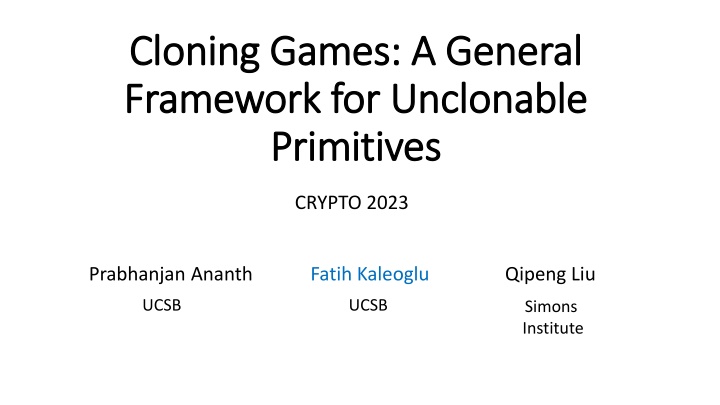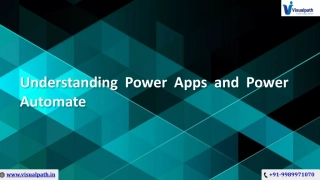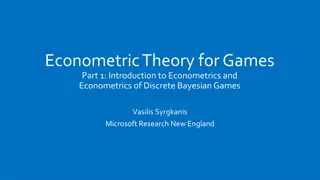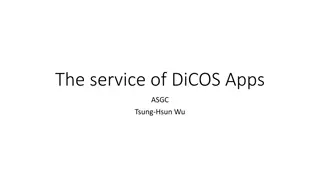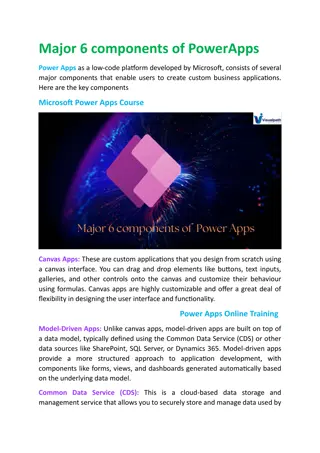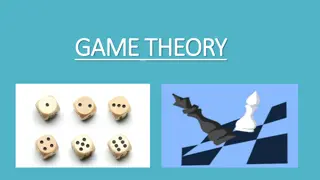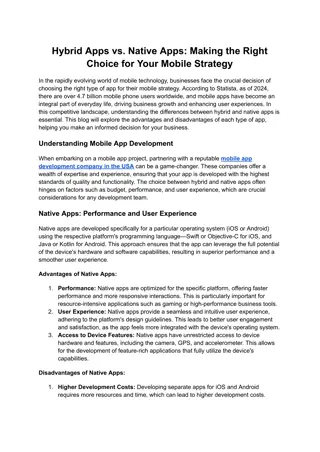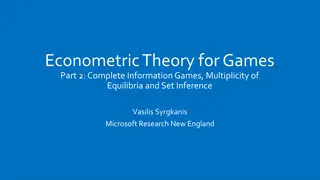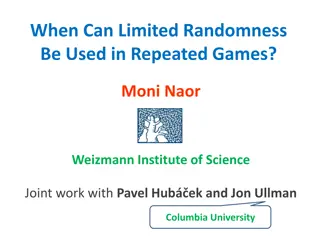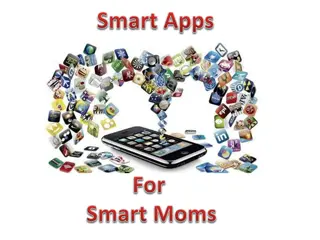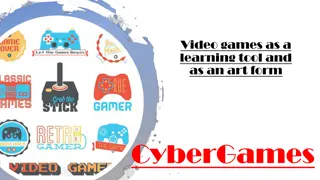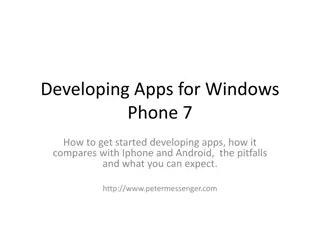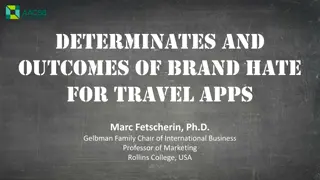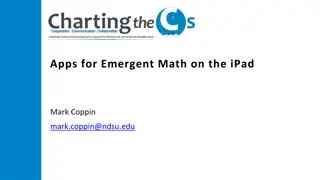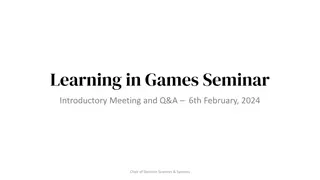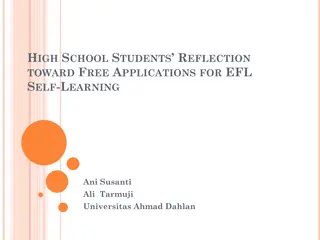Maximizing Learning Opportunities Through Educational Apps and Games
This content discusses the shift from traditional to modern education systems, emphasizing the benefits of interactive learning tools like educational apps and games. It explores how personalized approaches, dynamic syllabi, and gamified elements enhance engagement, motivation, and skill-building in learners. The article highlights the importance of incorporating interactive elements and gamification techniques to create a more effective and enjoyable learning experience.
Download Presentation

Please find below an Image/Link to download the presentation.
The content on the website is provided AS IS for your information and personal use only. It may not be sold, licensed, or shared on other websites without obtaining consent from the author.If you encounter any issues during the download, it is possible that the publisher has removed the file from their server.
You are allowed to download the files provided on this website for personal or commercial use, subject to the condition that they are used lawfully. All files are the property of their respective owners.
The content on the website is provided AS IS for your information and personal use only. It may not be sold, licensed, or shared on other websites without obtaining consent from the author.
E N D
Presentation Transcript
Cloning Games: A General Cloning Games: A General Framework for Unclonable Framework for Unclonable Primitives Primitives CRYPTO 2023 Prabhanjan Ananth Fatih Kaleoglu Qipeng Liu UCSB UCSB Simons Institute
No Partial Cloning X file2.quantum file1.quantum file.quantum Stronger than No-Cloning Output.txt Output.txt Output.txt
Unclonable Cryptography Classically Impossible Unconditional Quantum Advantage Algorithmic Advantage (conditional on assumptions) | New technologies
Unclonable Primitives MAJOR OPEN PROBLEM Unclonable Functionality ----------- Primitive Ciphertext ----------------------------- Unclonable Encryption (Gottesman 02, BL 20, AK 21, AKLLZ 22, ) Decryption Key ----------------------- Unclonable Decryption Keys (GZ 20, CLLZ 21, SW 22, ) Function Evaluation ----------------- Copy-Protection (Aaronson 09, CMP 20, CLLZ 21, AK 21, SW 22, ) Passing Public Verification --------- Public-Key Quantum Money (Aaronson 09, FGHLS 10, AC 12, Zhandry 17, LMZ 22, ) (Focus of this work) MAJOR OPEN PROBLEM
How to Improve Prior Work? Similar Techniques Used Complicated Proofs Limited Work On Implications Need a more systematic study! Impagliazzo s 5 worlds
Why Study the Relationship between Unclonable Primitives? (1) Minimal Computational Assumptions Impagliazzo s 5 worlds Black-Box Separations
Why Study the Relationship between Unclonable Primitives? (2) Types of States Wiesner (BB84) states near term Coset states long term Prepare & Measure Fault-Tolerant Quantum Computing
Why Study the Relationship between Unclonable Primitives? (3) Using existing classical techniques Hybrid method Goldreich-Levin Simultaneous Extraction Extraction
Contributions (Conceptual) New framework: Cloning Games
Contributions (Results) 1 Unconditionally secure Unclonable Decryption Keys in the plain model Prior Work: Public-key constructions from heavy assumptions (GZ 20, CLLZ 21) Relationship to Unclonable Encryption and Copy-Protection (GZ 20, SW 22)
Contributions (Results) 2 Unclonable Encryption with random oracle from Wiesner (BB84) states (*) Copy-Protection for single-bit point functions with random oracle from Wiesner (BB84) states (*) Prior Work: Same result from coset states (AKLLZ 22) Different security notions (BL 20, AK 21, KT 22) Impossibility of Copy-Protection (AL 20, AK 22) (*) Simplified security proof
Contributions (Results) 3 Relate different security notions for unclonable decryption keys and copy-protection No such prior work known.
Contributions (Results) 4 New construction of Encryption with Certified Deletion. (*) Security proof based on Monogamy of Entanglement (TFKW 13) Prior Work: Unconditionally secure construction (BI 20) Security proof based on entropic bounds. Other primitives with certified deletion (BK 22) (*) Simplified security proof
Cloning Games (Idea) Verifiable Quantum Token Unclonable
Cloning Games (1 - Setup Phase) Setup() TokenGen(sk) sk
Cloning Games (2 - Splitting Phase) Setup() TokenGen(sk) sk Entanglement Allowed
Cloning Games (3 - Verification Phase) (ch, ch ) ChallengeGen(sk) ACC/REJ ACC/REJ Ver(sk, ch, ans) Ver(sk, ch , ans ) ch ch ans ans Security: Pr[(ACC, ACC)] trivial success Correctness: Pr[ACC] 1
Cloning Games (Correctness) ch ans ACCEPTs with probability 1
Cloning Games (Security) ACCEPTs both with probability trivial success ch ch ans ans (Verification Phase)
Trivial Cloning Attack Alice treats as a black-box. 0: search trivial success 1/2: decision
Unclonable Primitives as Cloning Games Unclonable Encryption Setup Phase: Send ???(??,?) Verification Phase: check if ?? ?
Unclonable Primitives as Cloning Games Copy-Protection Setup Phase: Send copy-protection of ? Verification Phase: Captures almost all primitives: Single-Decryptor Encryption Quantum Money Tokenized Signatures ? ?(?) Certified Deletion
Cloning Games (Challenge Distributions) Correlation of (ch, ch ) determines: Independent-Challenge Mode Identical-Challenge Mode ch ch ans ans
Relationship Between Challenge Distributions (Result 3) Theorem: A class of cloning game secure against independent- challenges is also secure against identical-challenges. (E.g. CP with multi-bit output, SDE with multi-bit message)
TECHNIQUES TECHNIQUES Search Solver (Golreich-Levin) Decision Solver Goal: Relate search & decision games Non-Local Setting Search Solver Search Solver (Simultaneous Golreich-Levin) Decision Solver Decision Solver
APPROACH 1 (single query) APPROACH 1 (single query) Customized non-local reductions Challenge: One register affects the other AKLLZ 21 Query extraction in the random oracle model Project onto states with good eigenvalues (both Bob & Charlie succeed in the cloning game) Good states
How to avoid bad states? Reduce to strong (augmented) unclonable search security Known previously for coset states This work: any weakly (search) unclonable states (including BB84)
Search Game Bob and Charlie need to output a high min-entropy answer ? sk, ? Setup() TokenGen(sk, ?) ChallengeGen(sk) ch ch (ch, ch ) ? ?
Augmented Security ch ch ?? ??? = 1 ??? = 0, ? ? ? ?
Why do we need augmented security? AKLLZ 22: Strong monogamy game for cosets (CLLZ 21) Identical challenge to independent challenge reduction via program testing (Zhandry 20) This work: Weak unclonable security of Wiesner states (BL 20) Augmented security of Wiesner states Identical challenge to independent challenge reduction via program testing (Zhandry 20) Reduction requires access to the verification oracle ??( )
APPROACH 2 (multi APPROACH 2 (multi- -query) query) Lift Classical Reductions Challenge: Running an adversary can destroy its internal state. BBK 22: This Work: Quantum Black-Box Non-Adaptive Reduction Reduction Classical Black-Box Non-Adaptive Reduction Reduction Classical Non-Local Black-Box Non-Adaptive Quantum Non-Local Black-Box Non-Adaptive
Key Step Prior Work (BBK 22): This Work: (Quantum) Solver Non-Local Solver No Communication Persistent Non-Local Solver Persistent Solver
This Work: Prior Work (BBK 22): Non-Local Persistence Theorem: Persistence Theorem: Run Non-Local Solver Run Solver Repair (CMSZ 21) Run Repair (CMSZ 21) to recover success probability Repair (CMSZ 21)
Jordan Subspaces |??? (entangled) Perform Jordan subspace measurement Commutes with the repair procedure Unentangles the state ??? (unentangled)
Jordan Subspaces Local repair sufficient for independent challenges (convexity) ??? (unentangled)
Non-Local Lifting - Summary Locally repair both Bob s and Charlie s states. Works in the independent challenge setting. Proof by looking at the Jordan decompositions.
Non-Local Lifting - Corollaries One-time unclonable decryption keys in the plain model (result #1) Independent vs. identical challenge security (result #3)
Construction of Unclonable Decryption Keys Setup(1?): Output ?,? {0,1}? {0,1}? Enc((?,?), ?): Output (?, ?,? ?,?) Output ??|? ?|?? QKeyGen(): Dec(?, (?,? ,?)): Measure ? in basis ?? to get ?. Output ?,? ?
Open Problems Open Problems 1. Relating challenge distributions for non-evasive cloning games 2. Achieving Unclonable Encryption and Copy-Protection for point functions in the plain model 3. Removing Black-Box/Non-Adaptive restrictions from the Non-Local Lifting Theorem
Thank You! Q & A
